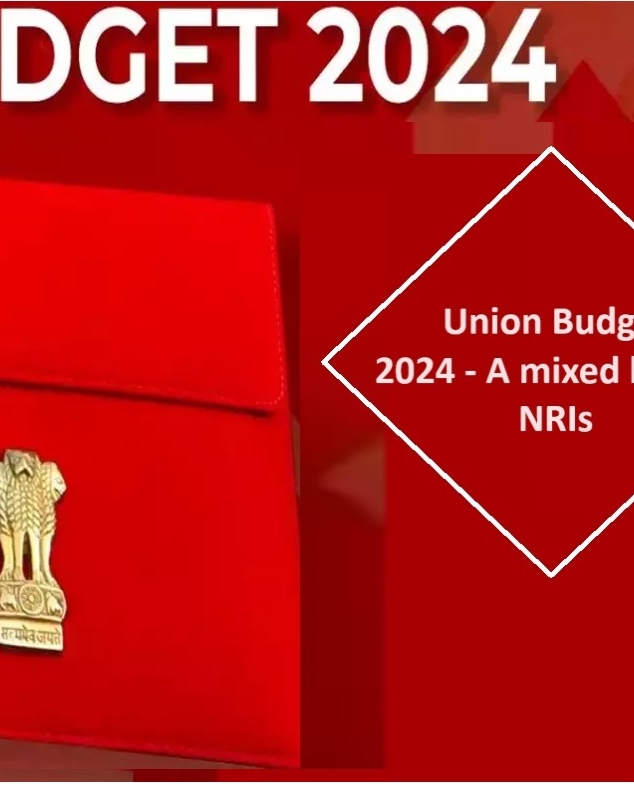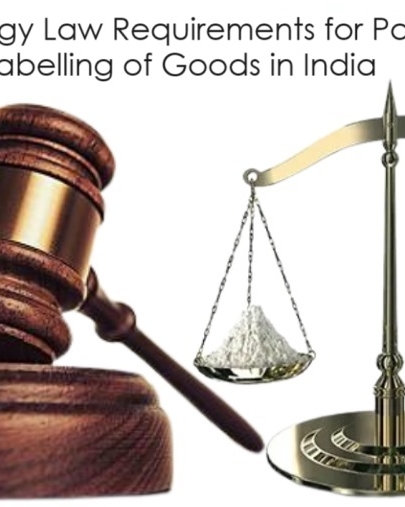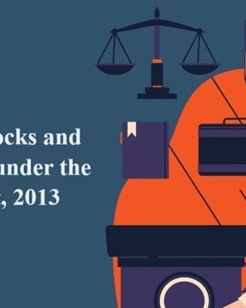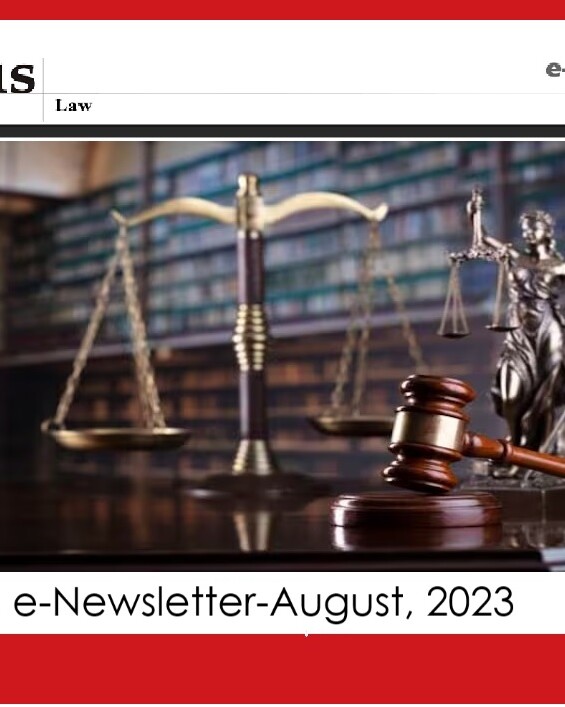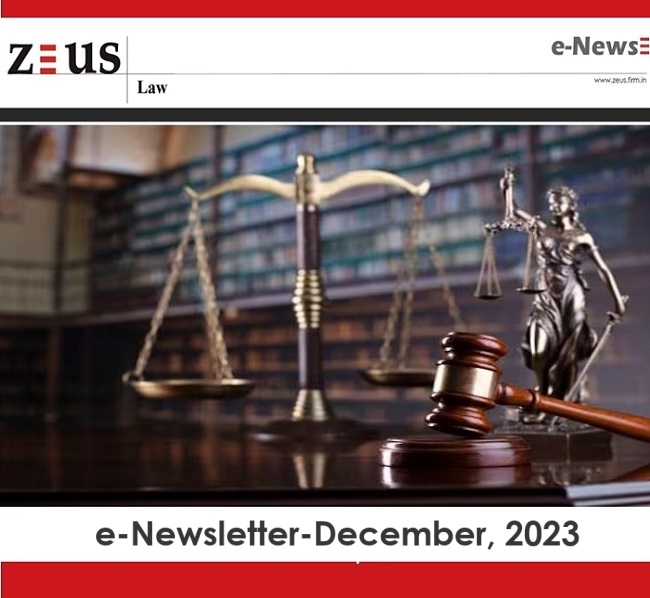
Highlights:
Corporate Brief
- Master Direction dated 07.11.2023 issued by RBI in regard to Information Technology, Governance, Risk, Controls and Assurance Practices.
- Circular dated 08.11.2023 issued by SEBI in regard to procedural framework for dealing with unclaimed amounts lying with Real Estate Investment Trusts (REITs) and manner of claiming such amounts with unitholders.
- Circular dated 08.11.2023 issued by SEBI in regard to procedural framework for dealing with unclaimed amounts lying with Infrastructure Investment Trusts (InvITs) and manner of claiming such amounts with unitholders.
- Circular dated 13.11.2023 issued by SEBI in regard to the Most Important Terms and Conditions (MITC) for all Stock Brokers through recognized Stock Exchanges.
- Notification dated 16.11.2023 issued by RBI in regard to regulatory measures to consumer credit and bank credit to NBFCs.
- Circular dated 17.11.2023 issued by SEBI regarding simplified norms for processing investor’s service request by RTAs and norms for furnishing PAN/KYC details and nominations.
RERA Brief
- Direction dated 21.11.2023 issued by Odisha Real Estate Regulatory Authority for imposition of penalty for delayed submission of Quarterly Progress Report (QPR) and Annual Audit Certificate (AAC) by promoters.
- Notification dated 29.11.2023 issued by the Uttar Pradesh Real Estate Regulatory Authority (U.P. RERA) notifying the Real Estate Project (Maintenance and Operation of Project Bank Accounts) Directions, 2020 as revised in November, 2023.
- Office Memo dated 29.11.2023 issued by U.P. RERA on instructions being issued due to non-compliance of instructions in respect of maintaining transparency in business practices.
NCLT Brief
- Whether the period of limitation for filing an appeal begins from the date of order or the date of uploading / receipt of order?.
Litigation Brief
- Court can Examine if Arbitration Clause Violates Article 14 while Considering an Application under S.11 (6) of the Arbitration & Conciliation Act, 1996.
- Third Parties can be now bound by the Arbitration Agreement: Supreme Court Ends the Debate.
Corporate Brief
Notification dated 07.11.2023 issued by RBI in regard to Master Direction on Information Technology Governance, Risk, Controls and Assurance Practices.
- RBI vide its notification bearing no. RBI/2023-24/107 DoS.CO.CSITEG/SEC.7/31.01.015/2023-24 dated 07.11.2023 issued master directions on information technology governance, risk, controls and assurance practices. RBI under the Bi-Monthly Monetary Policy Statement 2021-2022 dated 10.02.2022 announced that draft guidelines, updating and consolidating the instructions related to Information Technology (IT) Governance and Controls, Business Continuity Management and Information Systems Audit, will be issued by the Reserve Bank of India.
- A draft Master Direction on the subject was published in October 2022 seeking public comments. Based on the feedback, Reserve Bank of India issued the final Reserve Bank of India (Information Technology Governance, Risk, Controls and Assurance Practices) Directions 2023.
Read more at the following weblink Reserve Bank of India – Notifications (rbi.org.in)
Circular dated 08.11.2023 issued by SEBI in regard to procedural framework for dealing with unclaimed amounts lying with Real Estate Investment Trusts (REITs) and manner of claiming such amounts with unitholders.
- SEBI vide its circular SEBI/HO/DDHS/DDHS-RAC-1/P/CIR/2023/177 dated 08.11.2023 laid down the guidelines and procedure to deal with unclaimed amounts lying with Real Estate Investment Trusts (REITs) and manner of claiming such amounts with unitholders.
- This framework defines the procedure to be followed by a REIT for transfer of unclaimed amounts, initially to an Escrow Account and subsequently, to the IPEF and claim thereof by a unitholder.
- The entire framework is divided into three parts, the first part states the procedure and guidelines for transfer of the unclaimed amounts to an Escrow Account / Unpaid Distribution Account of the REIT by the manager, the second part states the procedure and guidelines for transfer of unclaimed amounts from Unpaid Distributions Account of the REIT to IPEF by the manager, the third part details the procedure for claim by legal heir/successor/nominee.
. Read more at the following weblink.
Circular dated 08.11.2023 issued by SEBI in regard to procedural framework for dealing with unclaimed amounts lying with Infrastructure Investment Trusts (InvITs) and manner of claiming such amounts with unitholders.
- SEBI vide its circular SEBI/HO/DDHS/DDHS-RAC-1/P/CIR/2023/178 dated 08.11.2023 laid down the guidelines and procedure to deal with unclaimed amounts lying with Infrastructure Investment Trusts (InvITs) and manner of claiming such amounts with unitholders.
- This framework defines the procedure to be followed by an InvIT for transfer of unclaimed amounts, initially to an Escrow Account and subsequently, to the IPEF and claim thereof by a unitholder.
- The entire framework is divided into two parts, the first part states the procedure and guidelines for transfer of the unclaimed amounts to an Escrow Account / Unpaid Distribution Account of the InvIT by the manager and the second part states the procedure and guidelines for transfer of unclaimed amounts from Unpaid Distributions Account of the InvIT to IPEF by the manager.
Read more at the following weblink.
Circular dated 13.11.2023 issued by SEBI regarding the Most Important Terms and Conditions (MITC) for all Stock Brokers through recognized Stock Exchanges.
- SEBI vide its circular No. SEBI/HO/MIRSD/MIRSD-PoD-1/P/CIR/2023/180 dated 13.11.2023 has prescribed certain uniform documents for formalizing the broker-client relationship as per clause 20 of the “Master Circular on Stock Brokers” dated 17.05.2023. The brokers are required to provide their clients with a copy of all the documents mentioned in this circular free of charge. In furtherance of the above mentioned amendment, an additional clause 20.1.6 shall be incorporated in the circular and clause 20.4 stands amended.
- The form, nature of communication, documentation and detailed standards for implementation of MITC shall be published on or before 01.01.2024 by the Brokers’ Industry Standards Forum (ISF), under the aegis of Stock Exchanges, in consultation with SEBI.
- It further states that in case ISF is unable to do the same, SEBI may at its discretion publish the standards in this respect. The master circular stands amended, mentioning the Most Important Terms and Conditions (MITC) in clause 20.1.6 and the clients’ requirement to acknowledge the MITC in clause 20.4 of the master circular.
- For onboarding of new clients, the date of implementation and compliance by the market participants shall be 01.04.2024.
Notification dated 16.11.2023 issued by RBI in regard to regulatory measure to consumer credit and bank credit to NBFCs.
- RBI vide its circular no. RBI/2023-24/85 DOR.STR.REC.57/21.06.001/2023-24 dated 16.11.2023 issued certain regulatory measures towards consumer credit and bank credit to NBFCs.
- A high growth in consumer credit and increasing dependency of NBFCs on bank borrowings was observed by the Governor and mentioned in Governor Statement dated 06.10.2023 flagging these issues. Based on the observations following measures are being taken:
- Increase in respect of the consumer credit risk weight to the consumer credit exposure of commercial banks, including personal loans, but excluding housing loans, education loans, vehicle loans and loans secured by gold and gold jewelry, by 25 percentage points to 125%.
- The consumer credit exposure of NBFCs categorized as retail loans, excluding housing loans, education loans, vehicle loans and loans secured by gold and gold jewelry and Microfinance/SHG Loans, shall attract a risk weight of 125%.
- The risk weight on credit card receivables of NBFCs is also increased by 25 percentage points to 125%.
- Increase in the risk weights on such exposures of SCBs by 25 percentage points in all cases where the extant risk weight as per external rating of NBFC is below 100%. Loans to HFCs and loans to NBFCs which are eligible for classification as priority sector in terms of the extant instructions shall be excluded.
Circular dated 17.11.2023 issued by SEBI regarding simplified norms for processing investor’s service request by RTAs and norms for furnishing PAN, KYC details and nominations.
- SEBI vide its circular No. SEBI/HO/MIRSD/MIRSD-PoD-1/P/CIR/2023/181 dated 17.11.2023 has amended Para 19.2 of the Master Circular for Registrar to an Issue and Share Transfer Agents dated 17.05.2023 bearing circular No. SEBI/HO/MIRSD/MIRSD-PoD-1/P/CIR/2023/37 dated 16.03.2023, based on the representations received from Registrars’ Association of India, feedback from investors and to address the challenges on freezing of folios and referring frozen folios under the Benami Transactions (Prohibition) Act, 1988 and/or Prevention of Money Laundering Act, 2002
- Stock Exchanges, Depositories, RTAs, and listed companies have been advised to comply with the conditions mentioned in the said circular and are further required to make necessary amendments to relevant by-laws, rules and regulations and it may seem fit for the implementations of the circular.
Real Estate Brief
Direction dated 23.11.2023 issued by Odisha Real Estate Regulatory Authority for imposition of penalty for delayed submission of Quarterly Progress Report (QPR) and Annual Audit Certificate (AAC) by promoters.
- As per the direction dated 23.11.2023 issued by Odisha Real Estate Regulatory Authority (Odisha RERA) for imposition of penalty for delayed submission of Quarterly Progress Report (QPR) and Annual Audit Certificate (AAC) by promoters, the Odisha RERA has observed that many promoters have not filed QPR and AAC within the timeline prescribed in the Real Estate (Regulation and Development) Act, 2016 (Act) and Odisha Real Estate (Regulation and Development) Rules, 2017 (Rules).
- Section 11 (a) to (e) of the Act read with the Rule 15 (1)(c)(d) of the Rules require the Promoter to update the QPR in respect of the Project on the website of Authority and Section 4(2)(1)(D) mandates the Promoter to get their accounts audited within 6 (six) months after the end of every financial year by a Chartered Accountant and upload the AAC on the website.
- Therefore, the Authority has decided to levy penalty for non-compliance of the aforesaid provisions of the Act and Rules as set forth in the direction dated 21.11.2023, with immediate effect. The direction also states that in case of non-compliance of the aforesaid provisions of the Act and Rules resulting in imposition of penalty by the Authority, any failure on part of the Promoter to pay the penalty amount(s) so imposed, would lead to the Authority not considering grant of further extension to the project or allowing registration of new projects by the concerned Promoter.
Notification dated 29.11.2023 issued by the Uttar Pradesh Real Estate Regulatory Authority (U.P. RERA) notifying the Real Estate Project (Maintenance and Operation of Project Bank Accounts) Directions, 2020 as revised in November, 2023.
- P. RERA vide notification dated 29.11.2023 issued the revised directions for the opening, operation and maintenance of the accounts of the project accounts i.e., the Uttar Pradesh Real Estate Regulatory Authority (U.P. RERA) notifying the Real Estate Project (Maintenance and Operation of Project Bank Accounts) Directions, 2020 as revised in November, 2023 (Directions).
- As per the Directions the Promoter is required to open three bank accounts, namely ‘Collection Account of the Project’, ‘Separate Account of the Project’, and ‘Transaction Account of the Project in a single scheduled bank -for the real estate project before applying for its registration with the Authority.
- The Directions set forth the manner of creation, maintenance and operation of the ‘Collection Account of the Project’ (refer Direction 3 (A), ‘Separate Account of the Project’ (refer Direction 3 (B), and ‘Transaction Account of the Project (refer Direction 3 (C) as well as the manner in which the funds in the respective accounts are to be utilized and the procedure for the same.
- The Directions further lay down the modalities of operation of the RERA project bank accounts, the advice and instructions to be provided by the Promoter for operating the respective accounts and the form and manner in which such advice/ instructions are to be provided to the bank.
- The permitted withdrawals/transfer from the Separate Account of the project, the framework for effectuating the withdrawals and the documents required to be furnished including form and manner of reporting from the Chartered Accountant, have been set forth in Direction 5 of the Directions.
- The directions also detail the reporting requirements and obligations of the Promoter in respect of the RERA Accounts, the requirement for audit of the RERA Accounts, and the submission of details related to project financing. Further directions for disclosure of project finance by the Promoter, the documents required to be uploaded for disclosing the status of financing/ unsecured loan availed for the project have been set forth at Direction 10.
- The exceptional conditions and circumstances under which the bank accounts of the project may be changed once the same has been disclosed by the promoter on the website of the Authority have also been listed in the Directions (refer Para 7 of the Directions).
- The powers of the Authority with respect to the Separate Account of the Project and the directions related to the closure of Separate Account on completion of the project, the application procedure and the documents to be furnished have been set forth at Direction 8 and 9 respectively.
- The obligation of the banks’ vis a vis the RERA Accounts have also been detailed in the Directions.
Office Memo dated 29.11.2023 issued by U.P. RERA on instructions being issued due to non-compliance of instructions in respect of maintaining transparency in business practices.
- The Office Memo dated 29.11.2023 issued by U.P. RERA instructions issued regarding non-compliance of instructions in respect of maintaining transparency in business practices by the Developers, mentions the following key points:
- That advertisement, booking or sale of any project involving more than 500 square meters of land area or more than 08 apartments is prohibited without RERA registration. In many cases, RERA registration number and RERA portal are not being mentioned or are not being mentioned prominently. In this regard, compliance with the provisions of Act and corresponding appliable rules should be ensured.
- To make the process of correspondence related to registered and proposed projects official and effective, the promoter is required to provide to RERA Authority the details of any of its responsible directors, who have been authorized by a board resolution of the company. In all correspondence with RERA Authority, the name and designation of this authorized director will be mentioned. If there is any difference in the details provided for correspondence, it should be immediately informed to the RERA office.
- In many cases, promoters face problems in working on the RERA portal. In this regard, it is necessary that all promoters hire skilled and knowledgeable personnel to work on the RERA portal. In the past, workshops have been organized for training on various works related to RERA and is also proposed to be organized in the future as well. Promoters are to ensure that their personnel/ technical team attend and participate in such workshops/ programs.
- Communication with buyers/potential buyers is an important point. In many cases, it has come to notice that the contact number related to the project is either non-functional or the buyers are not receiving proper response. All promoters should ensure that the mobile and landline numbers related to the project are in working condition. Further, expert personnel should be deployed, who will provide proper information to the consumers. These numbers should also be publicized.
- The mobile number of the project co-ordinator and the mobile number and e-mail ID of the promoter related to the project are received at the time of registration. All correspondence related to the project takes place on the e-mail ID, hence special care should be taken while dealing with the e-mail ID.
- Different sets of information related to the promoter and the project is required at the time of registration under RERA Act and corresponding applicable rules. This information should be made available as required.
- Arrangements have been made to provide the format of agreement for sale approved by the government at the time of project registration in RERA. This format is to be used by all promoters while registering a new project.
- The promoter is required to provide the e-mail of the bank related to the project at the time of registration of the new project.
NCLT Brief
Whether the period of limitation for filing an appeal begins from the date of order or the date of uploading / receipt of order?
Brief Facts:
Vistara ITCL (India) Limited (“Respondent”) filed an application under Section 7 of Insolvency and Bankruptcy Code, 2016 (“Code”) before the Hon’ble National Company Law Tribunal (“NCLT”) for initiating the Corporate Insolvency Resolution Process (“CIRP”) of Evirant Developers Private Limited (“Corporate Debtor”). An application was filed in the Section 7 Application by the appellant alleging that the Section 7 application was a collusive one on which submissions were held on 17.05.2023; however, the NCLT did not pronounce the order on 17.05.2023. The Order dated 17.05.2023 was uploaded by the registry of NCLT on 30.05.2023 which stated that the application is dismissed.
An appeal was preferred before the Hon’ble National Company Law Appellate Tribunal (“NCLAT”) against the Order dated 17.05.2023. The appeal filed before the NCLAT was dismissed on the grounds of limitation. Thereafter, the Appellant preferred an appeal before the Hon’ble Supreme Court.
Observation and decision of Hon’ble Supreme Court:
The Hon’ble Supreme Court held that the date of pronouncement is the relevant date for computing limitation and not the date of upload or receipt of the certified copy. However, the Supreme Court deliberated upon the distinction between “hearing of a matter” and “pronouncement of order” as per the National Company Law Tribunal Rules, 2016 (“NCLT Rules”).
The cause list for 17.05.2023 placed on record by the appellant indicated that the case was listed for admission and not for pronouncement. Further, on a specific query of the Court, it was not in dispute between counsel for the appellant and the respondent that no substantive order was passed on 17.05.2023 by the NCLT. In these circumstances, limitation could not begin to run on 17.05.2023 which was the date on which hearings concluded. As no order was passed before 30.05.2023, there was no occasion for the appellant to lodge an application for a certified copy on 17.05.2023. Time for filing an appeal would commence only when the order appealed from was uploaded since prior to that date no order was pronounced.
The Supreme Court held that as no order was pronounced by the NCLT on 17.05.2023, limitation could only commence from 30.05.2023, i.e., the date of upload of the order. In light of the above, the order of the NCLAT was set aside and the appeal filed before the NCLAT was restored with directions to dispose of the appeal at the earliest.
Case title: Sanjay Pandurang Kalate vs Vistara ITCL (India) Limited & Ors. [C.A. Nos. 7467-7468 of 2023]
Litigation Brief
Third Parties can be now bound by the Arbitration Agreement: Supreme Court Ends the Debate
Case Title: Cox & Kings Ltd. v. SAP India (P) Ltd., 2023 SCC OnLine SC 1634
Court: Supreme Court of India
Factual Matrix:
- The factual matrix of the case was not mentioned while this judgment was produced, as many broader issues have been dealt with in the judgment to settle broader legal issues raised in the reference. For a quick reference, a small gist of facts has been mentioned herein.
- Cox and Kings Limited (Petitioner) entered into a Software End User License Agreement and a SAP Enterprise Support Schedule, with SAP India Private Limited (Respondent No. 1). In 2015, while developing its e-commerce platform, Petitioner considered a recommended Hybrid Due to implementation issues, Petitioners rescinded in 2016, demanding a refund.
- Disputes arose, and Respondent No. 1 invoked an arbitration, demanding Rs. 17 crores for wrongful termination. A Tribunal was constituted, but SAP SE GMBH (a company that gave assurance on behalf of SAP when disputes arose between the parties) was not part of the proceedings. Simultaneously, Petitioner filed an application under Section 16 of the Arbitration & Conciliation Act, 1996 (hereinafter referred to as “ the Act”) claiming that four agreements constituted a composite transaction.
- In November 2019, Petitioners sent a second notice invoking arbitration including Respondent No. 2. With no response, Petitioners filed an application under Section 11 of the Act before a three-judge bench of the Supreme Court. The Hon’ble Court referred the matter to a larger Constitutional Bench.
Issue in question:
- Whether the group of companies doctrine should be read into Section 8 of the Act or whether it can exist in Indian jurisprudence independent of any statutory provision?
- Whether the group of companies doctrine should continue to be invoked on the basis of the principle of “single economic reality”?
- Whether the group of companies doctrine should be construed as a means of interpreting the implied consent or intent to arbitrate between the parties?
- Whether the principles of alter ego and/or piercing the corporate veil can alone justify pressing the group of companies doctrine into operation even in the absence of implied consent?
Observation made by the Supreme Court of India
- The Constitution Bench of the Apex Court answered in the affirmative and held that both signatory and non-signatories are included in the definition of parties under Section 2(1)(h) and Section 7 of the Act.
- Conduct of non-signatories can indicate consent to be bound, and a written agreement is not a requirement to bind non-signatory parties.
- The application of the “Group of Companies” doctrine requires consideration of cumulative factors, and the single economic unit principle alone is insufficient.
- Persons claiming “through or under” can assert rights in a derivative capacity. It observed, “The expression “claiming through or under” in Sections 8 and 45 of the Act is intended to provide a derivative right, and it does not enable a non-signatory to become a party to the arbitration agreement. The decision in Chloro Controls India (P) Ltd v. Severn Trent Water Purification Inc., tracing the Group of Companies doctrine through the phrase “claiming through or under” in Sections 8 and 45 is erroneous. The expression ‘party’ in Section 2(1)(h) and Section 7 is distinct from “persons claiming through or under them”.”
- The Apex Court also held that at the referral stage, the court should leave it to the Arbitral Tribunal to decide whether a non-signatory is bound by the arbitration agreement or not.
Decision:
- The Hon’ble Supreme Court held that the arbitration agreement can bind the non-signatories. It held that a non-signatory affiliate or sister or parent company can be a party to an arbitration agreement if there is mutual intention of the signatories and non-signatories to this effect. In order to determine mutual intention, the Apex Court laid down factors such as direct relationship, direct commonality of subject matter, and a composite transaction where the performance of multiple agreements is inextricably connected.
Court can Examine if Arbitration Clause Violates Article 14 while Considering an Application under S.11(6) of the Arbitration & Conciliation Act, 1996.
Case referred: Lombardi Engineering Ltd v. State of Uttarakhand [Arbitration Petition No. 43 of 2022] (2023 SCC OnLine SC 1422)
The Hon’ble Supreme Court allowed an application under Section 11(6) of the Arbitration & Conciliation Act, 1996 filed by Lombardi Engineering Ltd. (“Applicants”), a Swiss company seeking appointment of an arbitrator in a dispute with the State of Uttarakhand (“Respondents”).
The three-judge bench comprising Chief Justice DY Chandrachud, Justice JB Pardiwala, and Justice Manoj Misra while allowing the application u/s 11(6) (“said Application”) of the Act held that arbitration clause which is arbitrary and violates Article 14 of the Indian Constitution is unenforceable.
The said Application was filed as there was a dispute between the parties regarding non-payment of dues to the applicants for rendering services stipulated in the contract. The total sum in the dispute was less than INR 10 crores and hence the arbitrator was to be appointed by the Principal Secretary/Secretary (Irrigation), as per the contract. The Applicants contended that keeping in mind the latest developments, unilateral appointments are not permissible; hence, they shall also intimate the name of the arbitrator to the Respondent. However, the respondent did not approve the name suggested by the applicants, instead, it terminated the contract on the ground of non-performance of obligations. The Applicant, therefore, filed an application under Section 11(6) of the Act.
Submissions of the Applicant
While praying for the appointment of an arbitrator, the applicant contested the legality of two specific aspects of Clause No. 55 of the contract which stipulated the arbitration clause – a) the condition of a pre-deposit of 7% of the total claim by the party who is initiating the arbitration, and b) the power vested in the Principal Secretary/Secretary (Irrigation) to appoint a sole arbitrator. It contended that the condition of the 7% pre-deposit is against the ruling of the Apex Court in the case of ICOMM Tele Limited v. Punjab State Water Supply and Sewerage Board, (2019) 4 SCC 401 (“ICOMM Tele Limited case”). While, on the other hand, the power to appoint a sole arbitrator given to the Principal Secretary/Secretary was against the ruling given in Perkins Eastman Architects DPC v. HSCC (India) Limited, (2020) 20 SCC 760 (“Perkins Eastman Architects DPC case”). Hence, it argued that the clause is arbitrary and violative of Article 14 of the Indian constitution.
Submissions of the Respondent
Replying to the contentions put forth by the applicants, the Respondent submitted that the Applicant has incorrectly relied on the ICOMM Tele Limited case as the arbitration clause in that case is differently worded. Instead, the Respondent placed heavy reliance on S.K. Jain v. State of Haryana, (2009) 4 SCC 357 (“S.K. Jain case”), wherein a similar clause regarding pre-deposit was mandated. Here, the Court had held that the clause providing for pre-deposit is logical and acts as a balancing factor to prevent frivolous and inflated claims. Moreover, the Respondent contended that the deposit is merely a security and the same is refundable. Lastly, it stated that the legality of the requirement of a pre-deposit cannot be contested in an application under Section 11 which only provides for the appointment of arbitrator.
Court’s observations
On the issue of 7% pre-deposit, the Court held that in ICOMM Tele Limited case, the Court had distinguished the facts of S.K. Jain case. It held that in the S.K. Jain case, the arbitration clause was different as it provided for the deposit after the conclusion of arbitration proceedings which is unlike the present arbitration clause which mandates for a pre-deposit before invoking arbitration. Moreover, the Court held that in S.K. Jain case, the Court did not adjudicate on the constitutionality of such clauses as there was no contention about the condition of pre-deposit being violative of Article 14 of the Constitution. Hence, the Court held that the condition of a pre-deposit is unconstitutional and violates Article 14 as the same is arbitrary.
On the other issue concerning locus under Section 11, the Court held that it is incorrect for the Respondent to contend that the legality of pre-deposit can only be challenged through a writ petition before the Court. The court relied on various case laws such as TRF Ltd. v. Energo Engg. Projects Ltd., (2017) 8 SCC 377, where the vires of arbitration clause vis-à-vis ‘operation of law’ in India has been dealt with by the courts. The Court held the arbitration clause must align with the Constitution of India, the Arbitration and Conciliation Act 1996, and any other relevant Central or State Law. The Court relied on Kelsen’s theory of Grundnorm and held that the Constitution of India is the grundnorm; it is the basic and ultimate source of law. Accordingly, the Court opinioned that the arbitration clause cannot fall foul of any of the abovementioned sources of law and held that the arbitration clause providing for unilateral appointment of arbitrator is violative of the Constitution as the same is against the principles of equality as enshrined in Article 14.
While coming to this conclusion, the Court also relied on various precedents of the Indian courts like the Perkins Eastman Architects DPC case and held empowering only one party to appoint the arbitrator would lead to an unequal bargain chip.
Court’s Decision
The Court allowed the said application and concluded that the two conditions contained in the arbitration clause pertaining to 7% pre-deposit of the total amount claimed and appointment of arbitrator by the Principal Secretary (Irrigation) Government of Uttarakhand can be ignored and appointed an independent arbitrator in the matter.
MAKING NON- SIGNATORIES PARTY TO ARBITRATION PROCEEDINGS: SUPREME COURT LAYS DOWN THE PRINCIPLES
IN THE MATTER OF: Cox & Kings Ltd. Vs. SAP India Pvt. Ltd. & Anr.
(Pronounced by the Hon’ble Supreme Court of India on 06.12.2023 in the ARB. P. 38 of 2020)
Facts:
- The captioned Judgement has been passed by the Constitution Bench of the Hon’ble Supreme Court, which redefines the group of companies’ doctrine in the arbitration landscape while considering an application under Section 11 of the Arbitration & Conciliation Act, 1996 [‘A&C Act’].
- The Supreme Court, in the captioned ruling, has established a forward-looking and arbitration-friendly precedent by incorporating principles derived from the legal frameworks of England and Singapore into the Indian context.
The Group of Companies’ Doctrine
- The doctrine of group of companies in the context of arbitration is a concept that allows an arbitration agreement signed by one or more companies within a group of companies to be extended to non-signatories under certain conditions.
- Illustratively, this is easier explained with an example. Presuming that “Company A” executed a contract with “Company B” for construction of a thermal power plant within a stipulated timeline. “Company B” has a related / subsidiary “Company C” who is not privy to the construction agreement, but carries out the construction of the power plant. Now, if “Company A” has any claims regarding the quality of construction or the delay in completion of the project, it can only claim the same against “Company B”. This is precisely where the group of companies’ doctrine steps in and treats a group of related/subsidiary companies as a unit. This principle allows a court or arbitral tribunal, in certain circumstances, to look beyond the legal personality of an individual company and treat a group of related/subsidiary companies as a single economic entity. This may be relevant in arbitration when dealing with issues such as corporate structures, parent-subsidiary relationships, or the abuse of the corporate form.
Background & The Reference made by the 3-Judge Bench of the Apex Court
- Initially, this issue was raised before the Supreme Court in the case of Chloro Controls (I) Pvt. Ltd. vs Severn Trent Water Purification Inc. & Ors (2013) 1 SCC 641 and the Court was inclined on the assertion that a non-signatory group companies were obligated by the arbitration agreement due to a shared intention among the parties. The Supreme Court noted that when there exists a “mother agreement” along with other “ancillary agreements” addressing various aspects of a comprehensive transaction, the arbitration clause within the mother agreement extends its binding effect to all parties engaged in the transaction.
- The correctness and validity of the Chloro Controls judgment (supra) was challenged before the Supreme Court in Cox and Kings Limited v. SAP India Private Limited (2022) 8 SCC 1. Subsequently, on 06.05.2022, a three-judge Bench of the Supreme Court, presiding over the matter referred the following questions to a larger bench for further elaboration and determination: –
- Whether the Group of Companies doctrine should be read into Section 8 of the Act or whether it can exist in Indian jurisprudence independent of any statutory provision?
- Whether the Group of Companies doctrine should continue to be invoked on the basis of the principle of “single economic reality”?
- Whether the Group of Companies doctrine should be construed as a means of interpreting the implied consent or intent to arbitrate between the parties?
- Whether the principles of alter ego and/or piercing the corporate veil can alone justify pressing the Group of Companies doctrine into operation even in the absence of implied consent?
Court’s Observations & Findings
- The court examined the definition of “parties” as outlined in Section 2(1)(h) in conjunction with the definition of “Arbitration Agreement” provided in Section 7 of the Act. While examining the above, the Court also referred to legal literature and practices employed by progressive jurisdictions such as USA, England, France and Singapore amongst others and affirmed that while the Act stipulated a written agreement, it did not expressly necessitate the signature of all parties. This was due to the recognition that an arbitration agreement could be established through the exchange of communications. Consequently, even individuals who did not formally sign the arbitration agreement, referred to as non-signatories, could be considered parties to the arbitration agreement if they had genuinely consented to its terms.
- The court also clarified that this was not an issue of extending the arbitration agreement to third parties but rather a process of identifying the actual or ‘veritable’ parties involved in the dispute. Recognizing the imperative to adopt a modern approach to consent, the court emphasized the necessity of addressing the practical aspects of complex transactions that encompass numerous interconnected agreements and entities.
- The judgment affirms that subsidiaries within a corporate group, despite not being explicit signatories to a particular arbitration agreement, may be obligated by such an agreement due to demonstrated implied/mutual consent, as determined on a case-to-case basis. In addressing the need for guidelines governing the practical application of the doctrine, the Court concluded that the authority to make such determinations lies within the purview of arbitral tribunals and the application of the doctrine should be based upon specific facts and conditions unique to each case, thereby allowing arbitral tribunals the flexibility to evaluate its appropriateness based on the facts presented before them.
- The Supreme Court further emphasized that in evaluating the applicability of the Doctrine, the considerations articulated in its precedent of Oil and Natural Gas Corporation Ltd v. Discovery Enterprises (2022) 8 SCC 42, should be collectively taken into consideration and the principle of single economic entity cannot be a sole factor. The application of these factors should be tailored to the specific facts of each case, considering the intricate nature of contemporary commercial ventures and includes factors such as the intention of the parties, role and connection of a non-signatory to the agreement or with a party that has signed the agreement, commonality of the subject matter, amalgamated or intertwined nature of the transaction and the execution of the contract.
- The Court additionally asserted that the rationale and methodology employed by the Court in the Chloro Controls (supra) case, wherein it linked the group of companies’ doctrine with the expression “claiming through or under,” is flawed. According to this judgment, the group of companies’ doctrine is an autonomous and distinct legal principle which originates from a comprehensive interpretation of Section 2(1)(h) in conjunction with Section 7 of the Act, and not from the specific language “claiming through or under.” The Court clarified that the group of companies’ doctrine is grounded in the interplay of these statutory provisions and does not solely rely on the language employed in the in Chloro Controls (supra).
Conclusion
The elucidation provided by the Court offers a much-needed clarity on the application of the doctrine, influencing the way businesses frame their contracts and arbitration clauses. This clarity is particularly valuable for entities operating within intricate corporate structures, navigating complex organizational frameworks, ensuring a nuanced understanding of arbitration obligations within the corporate group. This decision further contributes to the harmonization of Indian arbitration practices with international norms by aligning it with global standards. Companies can now anticipate the extension of arbitration clauses to group entities, allowing for better risk assessment and strategic legal planning.
***
Disclaimer:
For private circulation to the addressee only and not for re-circulation. Any form of reproduction, dissemination, copying, disclosure, modification, distribution and/ or publication of this Newsletter is strictly prohibited. This Newsletter is not intended to be an advertisement or solicitation. The contents of this Newsletter are solely meant to inform and is not a substitute for legal advice. Legal advice should be obtained based on the specific circumstances of each case, before relying on the contents of this Newsletter or prior to taking any decision based on the information contained in this Newsletter. ZEUS Law disclaims all responsibility and accepts no liability for the consequences of any person acting, or refraining from acting, on such information. If you have received this Newsletter in error, please notify us immediately by telephone.
Copyright © 2014 ZEUS Law. All rights reserved. Replication or redistribution of content, including by caching, framing or similar means, is expressly prohibited without the prior written consent of ZEUS Law.







